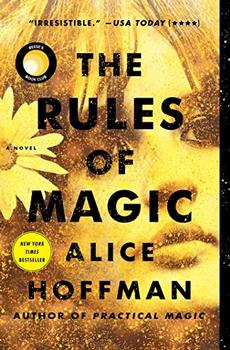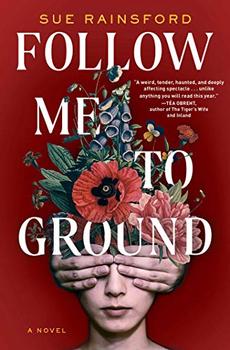Summary | Excerpt | Reading Guide | Reviews | Beyond the book | Read-Alikes | Genres & Themes | Author Bio

Alice Hoffman's Rules of Magic is the long-awaited prequel to one of her most cherished novels, Practical Magic (1995). With the return of Bridget and Franny, Hoffman proves again that the true magic of her work is not the sorcery itself, but the relationships between families, siblings, and the rest of the people that she brings to her readers. Emotionally wrenching without becoming trite, Hoffman explores love and loss in a way that few others have come close to mastering.
The Rules of Magic begins in the late 1940s. Franny, Bridget (Jet), and Vincent Owens knew for a long time that there was something different about them – from the strange rules kept by their mother, to occasional levitation, to their ability to read each other's thoughts – but they never knew the truth about their gifts until they are all sent away to stay with their mother's aunts the summer Franny turned 17. There, without the structure of the life they know at home, they learn the reasons why one of their mother's most stringent rules is a warning against ever falling in love: thanks to an ancestor, Maria Owens, their family is cursed with tragedy befalling any man who tries to love an Owens woman.
Of course, these warnings and knowledge cannot stop the temptation of youth to try to outwit all things, including fate. But it is through love of family, and finding the kind of love that can't be broken, that they survive and eventually find their places in a world that does not quite know what to make of their family. They learn to heal themselves, as well as a generation's old rift, and through this journey they eventually learn the true meanings of the lessons their aunts taught them all those years before. They finally take up their own place in the family home, with the porch light on, waiting for those in need.
Love and loss, and the ability to, not only face down tragedy, but to rise to its challenges; these are the rules of magic – and of life. What makes this story so strong is not only that it, though a prequel, stands firmly on its own ground, but that magic is not the focus of the book. Hoffman doesn't rely on the mystery of the supernatural to move the plot forward; as the Owens' children navigate the trials of love together, we learn to love them as they are – warts and all. Their journey is firmly rooted in time and place – war, the Stonewall Riots, and the draft all make an appearance – which helps ground the text in a New York City that, while few today can truly recall, many of us can culturally remember. There is a sense of restlessness, of searching for the room to grow and find oneself and one's place in the world. And the Owens' experience of being different in a small town is utterly relatable, even if, presumably, no reader can truly sympathize with possessing blood magic. Isolation after loss, coping with new and shocking knowledge (men die if they fall in love with you), and the experience of having to assume responsibility before you are ready for it – these are the things that Hoffman forces her readers to consider, and empathize with. As the Owens siblings grow, so too do readers, and that is a magic that few authors are able to exert through their texts.
Rules of Magic takes already known and beloved characters and adds a layer of depth that will enhance readers' understanding of them without detracting from the memories they might already have from the first book or the film. Whether meeting these characters for the first time, or having eagerly waited for more, readers are sure to return again and again for a taste of soap made by moonlight and Owens' magic.
![]() This review was originally published in The BookBrowse Review in October 2017, and has been updated for the
July 2018 edition.
Click here to go to this issue.
This review was originally published in The BookBrowse Review in October 2017, and has been updated for the
July 2018 edition.
Click here to go to this issue.

If you liked The Rules of Magic, try these:

by J. Nicole Jones
Published 2025
A dreamy California Gothic about a woman who moves to the mysterious town of Bellinas to save her marriage, only to be swept up in a hedonistic cult that isn't what it seems

by Sue Rainsford
Published 2021
A haunted, surreal debut novel about an otherworldly young woman, her father, and her lover that culminates in a shocking moment of betrayal - one that upends our understanding of power, predation, and agency.
Your guide toexceptional books
BookBrowse seeks out and recommends the best in contemporary fiction and nonfiction—books that not only engage and entertain but also deepen our understanding of ourselves and the world around us.